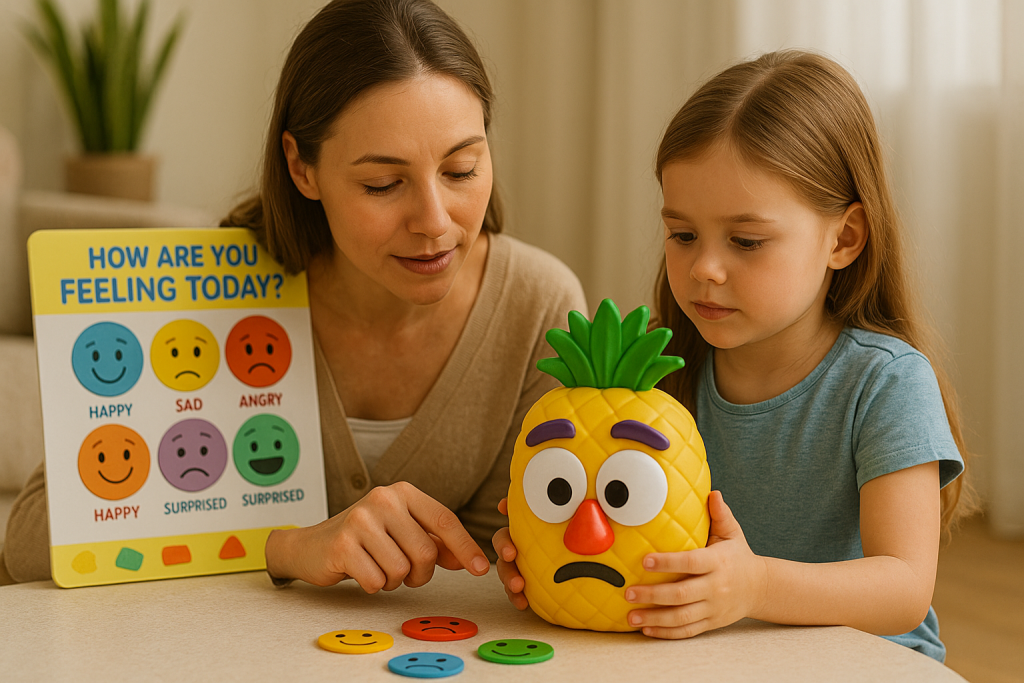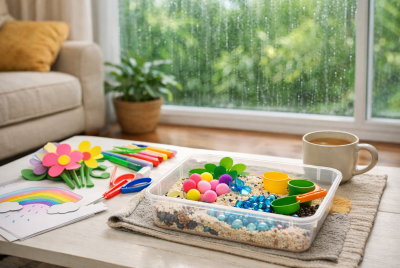10 Gentle Parenting Phrases That Actually Work (What to Say Instead of “Because I Said So”)
We may earn a commission for purchases made using our links. Please see our disclosure to learn more.
Parenting brings plenty of challenging moments, and it’s all too easy to fall back on old phrases like, “Because I said so.” But imagine if you could replace that response with words that actually build trust, invite cooperation, and show understanding. By using gentle parenting phrases, everyday struggles can become opportunities to connect more deeply with your child. If you want to make parenting feel less overwhelming—and a lot more meaningful—these ten phrases could change everything.
Why Words Matter in Parenting
The way we speak to our children shapes their self-image and how they view the world around them. Our language can nurture confidence, encourage independence, and create a safe space where kids feel free to share their thoughts and feelings. Gentle parenting is all about guiding instead of commanding, using words that foster teamwork rather than fear or shame.
The Problem With “Because I Said So”
Let’s be real: while saying “Because I said so” might get results in the short term, it rarely offers any lasting lessons. This phrase often leads to frustration, power struggles, and sometimes even resentment. Children need to understand the reasons behind the rules and boundaries set for them. That’s where gentle parenting phrases come in—they open the door to meaningful conversations, encourage problem-solving, and lay the groundwork for mutual respect.

10 Gentle Parenting Phrases That Make a Real Difference
If you’re ready to move beyond the usual responses, try these ten gentle parenting phrases in your daily routine—and discover how each one can improve communication and connection.
1. “I’m listening. Want to talk about it?”
Recognizing your child’s emotions lets them know you genuinely care. Instead of ending the conversation, you invite them to open up, which strengthens trust and teaches empathy.
2. “How about we do this together?”
Teamwork is at the core of gentle parenting. Inviting your child to work with you, whether it’s a chore or a challenge, shows that you value their help and creates more chances to bond.
3. “Can you tell me how you’re feeling?”
Checking in with your child encourages them to put their emotions into words. Learning to identify and share their feelings now will help them handle big emotions better as they grow.
4. “I notice you’re upset. Would you like a hug or some space?”
Offering choices shows that you respect your child’s needs and boundaries. By letting them pick what’s best for them in the moment, you’re showing acceptance and care.
5. “Let’s pause and try again.”
Everyone—kids and parents alike—can get overwhelmed. Suggesting a short break allows both of you to calm down and start over, preventing little conflicts from becoming big ones.
6. “What’s your idea for fixing this?”
Giving your child a role in solving problems encourages them to think things through. It helps build their decision-making skills and lets them feel valued and respected.
7. “I appreciate your honesty.”
Being truthful can be hard, especially for children. When you acknowledge their honesty, even if it’s about something difficult, you create an environment where open communication is safe.
8. “It’s okay to be angry, but let’s remember to be gentle.”
All emotions are valid, but it’s important to express them with kindness. This phrase lets your child know their feelings are normal while guiding them toward respectful behavior.
9. “What would make you feel more comfortable at this moment?”
Sometimes, your child knows exactly what will help them most. Asking this question empowers them to check in with themselves and learn how to cope.
10. “Thanks for talking with me. Let’s figure out a plan together.”
Showing appreciation for their cooperation builds respect. When you work together to find a solution, discipline becomes a shared process, not a power struggle.
Why Gentle Parenting Phrases Work
Gentle parenting phrases are powerful because they invite cooperation instead of compliance. Kids are more likely to follow guidance when they feel respected and understood. These phrases nurture emotional intelligence, problem-solving, and self-esteem—qualities that last far beyond childhood.
Research supports this approach. Children raised in supportive, communicative homes tend to have better mental health, stronger relationships, and improved academic outcomes. Your words today are shaping your child’s future.
For a closer look at both the science and the real-life challenges, check out this in-depth analysis of gentle parenting pitfalls and successes to see how gentle parenting plays out in families just like yours.
Scientific Research Supporting Gentle Parenting Phrases
Gentle parenting is more than simply a fad; it is supported by data. Researchers have looked closely at how positive, emotion-focused communication and supportive discipline affect children and families. Here are two important studies that demonstrate why soft parenting phrases make a difference:
Exploring the Meaning and Impact of Gentle Parenting
A 2024 study published in PLOS ONE—”An exploration of the meaning of gentle parenting“—provides the first systematic look at families using gentle parenting practices with young children. Researchers found that gentle parenting centers around calm emotion regulation, helping children manage their feelings, and showing high levels of affection. Most parents in the study reported greater satisfaction and a stronger sense of efficacy, though some also experienced fatigue and self-critique. The study highlights both the rewards and challenges of consistently using gentle phrases and mindful responses at home.
The Benefits of Gentle Guidance for Children’s Compliance
In the Journal of Family Psychology, the article “Maternal and paternal gentle guidance and young children’s compliance” explores how parental use of gentle guidance affects children’s willingness to cooperate. The researchers observed 57 families and found that when both parents used gentle, supportive guidance, children showed higher levels of committed compliance—actively helping and participating—rather than just going through the motions. This demonstrates that gentle parenting phrases, when used consistently by caregivers, foster real cooperation and positive family dynamics.
These studies confirm what many parents have discovered: using gentle, emotion-focused language can create a more cooperative, resilient, and connected family environment. For more science-backed parenting insights, explore the original research linked above.

Tips for Using Gentle Parenting Language at Home
- Be consistent: Kids thrive on predictability. The more you use gentle phrases, the more natural they become for everyone.
- Stay calm: Your tone matters as much as your words. Even gentle language can sound harsh if you’re stressed or impatient.
- Practice active listening: Put down your phone and make eye contact. Show your child that what they say is important.
- Model the behavior: Children learn by example. Use gentle phrases with your partner, friends, and family to reinforce their value.
- Don’t rush yourself; learning new habits takes practice. If you slip into old habits, acknowledge it and try again.
Recommended Products for Gentle Parenting
Gentle parenting isn’t just about what you say—it’s about creating an environment that supports calm, connection, and communication. Here are a few products from Amazon that can help:
- Big Feelings Pineapple by Learning Resources: This emotion toy lets kids explore and talk about feelings in a fun, hands-on way.
- Peaceful Parent, Happy Kids: How to Stop Yelling and Start Connecting (Book): A bestselling book packed with strategies for calm, effective parenting.
- Calm Down Jar Sensory Bottles: Sensory tools to help kids self-soothe during meltdowns.
Conclusion: Words Build Connection
The terms we employ are important. Every compassionate phrase contributes to a foundation of trust, respect, and open communication. Parenting isn’t about knowing all the answers; it’s about learning together, one discussion at a time. Begin small, try new phrases, and observe how your relationship with your child evolves.
Are you ready to generate more calm in your home? Begin with a single phrase. Watch how it alters the moment. Check out our recommended resources and join the conversation to learn more about gentle parenting.
FAQs
What is gentle parenting, in simple terms?
Gentle parenting means guiding kids with empathy, respect, and understanding rather than control or punishment. It’s about teaching, not just telling.
How do gentle parenting phrases impact children?
These phrases help kids feel heard, valued, and respected. They encourage emotional intelligence, cooperation, and healthy self-esteem.
Can gentle parenting work with toddlers?
Absolutely. Toddlers may not have all the words yet, but they understand tone and intent. Gentle phrases—paired with patience—help them learn boundaries and trust.
What if my child ignores gentle phrases?
No approach works 100% of the time. Consistency and patience are key. If you’re feeling stuck, try mixing up your phrasing or asking your child what might help them listen.
Are there resources for learning gentle parenting?
Yes! Books like “Peaceful Parent, Happy Kids” and online communities can offer support. Parenting classes, podcasts, and blogs are also helpful for ongoing learning.
Ready to try these gentle parenting phrases at home? Start today, and see how much more connected your family feels.




